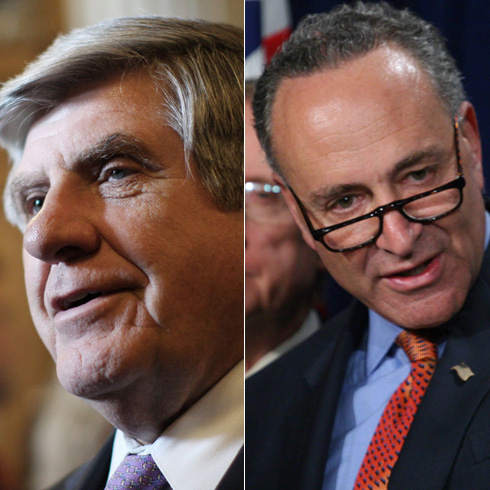With less than two months to go until Congress breaks for the holidays, the White House and Senate leaders are huddling to figure out how to pass a bill before the end of the year. As part of their push, both camps are meeting with conservative Democrats–most notably Sen. Blanche Lincoln (D-AR)–whose unanimous support is absolutely required simply to bring the bill to the floor. But leading Democrats are unlikely to make any progress until these swing-vote senators see the bill Majority Leader Harry Reid put together, along with a cost estimate from the Congressional Budget Office. They say that’s necessary before they make any decisions on even the earliest procedural votes, and there’s no clear indication as to when the CBO will weigh in.
Last night, Reid met with Sen. Chuck Schumer (D-NY), White House chief of staff Rahm Emanuel and others to discuss, among other things, how far they’ve come in convincing caucus conservatives to support the bill’s public option. “That’s one of many subjects, that wasn’t the main subject,” said Sen. Chuck Schumer (D-NY). Along the same lines, Reid spokesman Jim Manley suggests that this is part and parcel of an effort to move legislation sooner rather than later. They met, he said, to “discuss ways to try and get a bill done by the end of the year.”
But with conservative Democrats cold to the public option, and withholding their commitments to allow the bill to be debated on the floor, the White House and Democratic leaders have a lot of work ahead of them and they’ll likely have to work in tandem. On that score, this week, Lincoln–perhaps the most electorally vulnerable of all moderate Democrats–met with both Reid and President Obama to discuss the Senate bill.
The official line from the White House is that the meetings have been productive. “Senator Lincoln is playing a very constructive role, she’s working through issues that are of serious concern to her as all the members are, she’s paying very close attention to making a serious contribution to this discussion, these issues are getting worked through in the Senate,” said White House spokeswoman Linda Douglass.
On the other side of their efforts, though, are the moderates themselves, who remain in constant contact with each other about health care reform, and are constantly reviewing their options. Just yesterday, Lincoln met with Ben Nelson, Mary Landrieu, Joe Lieberman and others to keep apprised of the latest news in the hope of influencing the bill in a more conservative direction.
Nelson didn’t go so far as to suggest that he’s part of an emerging voting bloc, but he says he and like-minded Democrats partake in regular discussions to keep abreast of the latest developments, looking for new levers of influence. “There may be some developments,” he said, “we don’t know, for example what is going to come back from CBO–and one of the best things I’ve found is to keep talking to one another because somebody may hear something and it might be informative.”
And what are their goals? “The trigger’s always being discussed whenever we get together because the trigger’s associated with Senator Snowe and so there is a lot of discussion about, if you did do a trigger, what would it look like?”
But even if the bill does get to the floor, we may see this dynamic repeat itself. “If and when there aren’t 60 votes for shut of debate at some point,” Nelson said, “that’s when I think negotiations begin in earnest.”
Last week, Joe Lieberman announced that he’d ultimately oppose–and even filibuster–any health care bill that includes a public option. It was a bombshell announcement. But though reporters have spilled gallons of ink covering his defection, leadership’s most immediate concern is rounding up the 60 votes needed to bring the bill to the floor in the first place. Lieberman has suggested he’s willing to support the motion to proceed to debate, but Nelson, Lincoln, Landrieu, and others are still holding out, and unlike Lieberman, their concerns are have at least something to do with electoral politics, and the conservative constituents that they represent.










